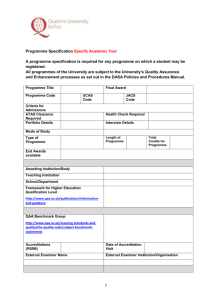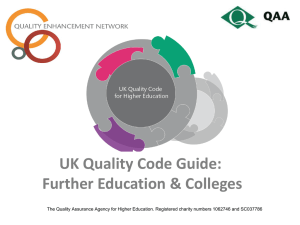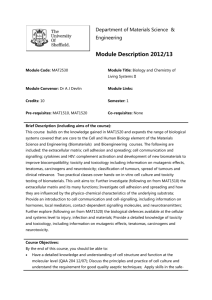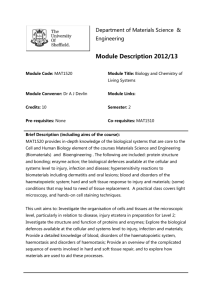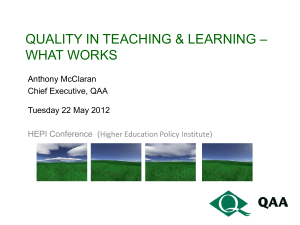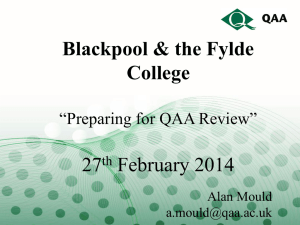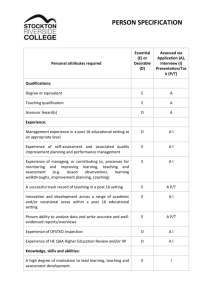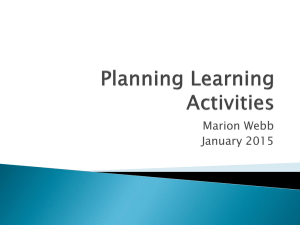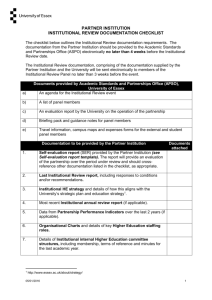guide and submission form - The Quality Assurance Agency for
advertisement
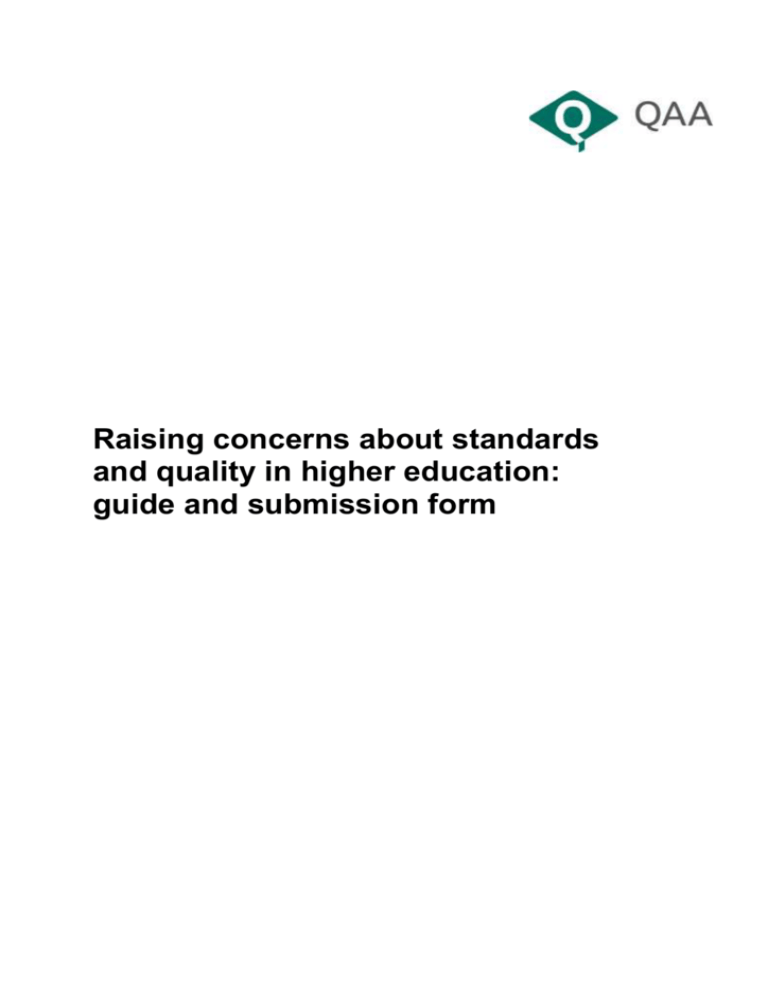
Raising concerns about standards and quality in higher education: guide and submission form Raising concerns about standards and quality in higher education: guide and submission form Please read through this guide before submitting your submission form. The guide is designed to assist you in completing the form with all the relevant information we require to deal with your submission efficiently. Once completed and signed, please return your submission to QAAConcerns@qaa.ac.uk or by post to: Concerns The Quality Assurance Agency for Higher Education Southgate House Southgate Street Gloucester GL1 1UB If you require us to communicate in a particular way due to disability, please contact us at enquiries@qaa.ac.uk or telephone 01452 557000. The Quality Assurance Agency for Higher Education: safeguarding standards and improving the quality of UK higher education. Contents A guide to raising concerns about standards and quality in higher education Principles The difference between a concern and a complaint How we investigate Screening 1 1 1 2 2 Stage one: initial inquiry 2 Stage two: full investigation 2 Outcomes Action plan and sign-off Reporting 3 3 4 Concerns raised by named organisations Concerns about programmes delivered with others Investigating Concerns in Wales Standards of service Protecting those raising concerns Contacting us Whom we can investigate How to raise a concern with us 4 4 4 5 5 5 6 6 Section 1: You and your higher education provider Section 1a - student 7 7 Section 1b - member of staff 9 Section 1c - neither student nor member of staff 9 What we can investigate Quality 11 11 Standards 11 Information about higher education provision 12 Examples of what we can investigate: 12 What we can't investigate 12 Section 2: Your concern The complaint history 13 14 Section 3: Completion of Procedures letter Evidence 15 16 Section 4: Evidence provided Declaration Anonymity 17 18 18 Section 5: Declaration Monitoring 19 20 Section 6: Monitoring form 21 Annex A 22 Annex B 23 A guide to raising concerns about standards and quality in higher education The primary responsibility for academic standards and quality in UK higher education rests with individual universities and colleges providing higher education (‘providers'). The Quality Assurance Agency for Higher Education (QAA) carries out reviews and reports on how well they meet their responsibilities. QAA can investigate concerns about the standards and quality of higher education provision, and the information that higher education providers produce about the learning opportunities they offer. Where there is evidence of weaknesses that go beyond an isolated occurrence, and where the evidence suggests broader failings in the management of quality and standards, we can investigate. These concerns may be raised by students, staff, external examiners, organisations, or anyone else. This guide is for those who wish to bring a concern to our attention. Note that 'we' refers to QAA throughout. Principles We work with the higher education sector to safeguard standards and improve quality in UK higher education. As part of the drive to maintain and enhance standards, we investigate concerns about standards and quality raised by students, staff and other parties. Where such concerns indicate serious systemic or procedural problems, we will conduct a detailed investigation. The difference between a concern and a complaint We use the term concerns to mean concerns about how higher education providers manage their academic standards, the quality of learning opportunities, and the information that they make available about their provision.1 We do not resolve individual complaints against providers and we are unable to provide redress or compensation to any individual submitting a complaint to us. However, we can look at individual complaints for evidence of broader failings in the management of academic quality and standards. Where we consider that these indicate serious systemic or procedural problems, we will investigate them as concerns. The aim of an investigation by QAA under the Concerns Scheme is to safeguard and improve the overall quality of UK higher education by addressing weaknesses within a particular higher education provider. Those seeking redress or compensation should contact the Office for the Independent Adjudicator.2 1 We have a separate process for complaints about QAA. We have a separate process for appeals for those raising formal objections to the outcomes of QAA reviews. This document is about our concerns procedure only. 2 www.oiahe.org.uk 1 How we investigate Screening Normally, we will screen information submitted formally to us within two to four weeks in order to determine whether it is something we can investigate. If we cannot investigate, we will explain why. Regardless of whether or not we can investigate, we will inform the higher education provider concerned of the matters raised and their nature, taking steps to protect the anonymity of the person raising the concern as appropriate. We may also pass information to other relevant organisations, such as a professional, statutory or regulatory body. Where the higher education provider has a QAA review visit scheduled within the next nine months, we may investigate the issues raised within that review and not produce a separate report about it. If we choose to investigate through a review, we will pass the information and accompanying evidence to the reviewers. We will explain the nature of the concern to the provider and invite them to provide a response to the reviewers. The reviewers' subsequent view of the seriousness and validity of the concern may affect the review outcome. Further information is available in our guide on referring concerns to reviews 3. Where the provider's next review visit is more than nine months away, we will normally investigate separately in two stages, as follows. Stage one: initial inquiry The purpose of the initial inquiry is to gather further information from the higher education provider and determine whether the evidence supports the concern. A case officer will read the submission and the supporting evidence in detail, and may refer to other evidence about the provider, including reports from QAA and other bodies. A serious concern, if well evidenced, can directly instigate a full investigation without an initial inquiry. The case officer may also ask the institution if and how it has dealt with the concern, and make enquiries of other organisations, such as professional bodies, where relevant. At the end of the initial inquiry, we will decide whether concerns remain and if they indicate unresolved systemic weaknesses. If so, we shall proceed to a full investigation. The outcomes of an initial inquiry are as follows: Concern is investigated A full investigation will be carried out as explained below. Concern is rejected If we decide that the concern should not proceed to a full investigation, we will write to the person who raised the issues to explain It is not possible to appeal against a decision why. to proceed to a full investigation. Stage two: full investigation Following an initial inquiry, and if there is sufficient evidence of a concern, there will be a full investigation. The purpose of the full investigation is to examine the evidence and determine whether it reflects serious systemic or procedural shortcomings by the provider. We will write 3 www.qaa.ac.uk/publications/information-and-guidance/publication?PubID=2850 2 to the provider setting out the nature of the concerns and asking for a (further) response and copies of relevant evidence. The full investigation will be led by a QAA member of staff or representative, and may also involve others, depending on the nature of the concern and its complexity. We will check to make sure no one involved in the investigation has a conflict of interest with the provider concerned. If the person leading the full investigation cannot resolve the case based on the information made available to us by the provider, they can request further information and/or arrange to visit the provider to meet relevant staff and/or students. The higher education provider will have the opportunity to comment on the factual accuracy of the findings. At the end of the full investigation, QAA will decide whether to make recommendations to the provider. Outcomes The consequences of a concern being upheld in whole or in part will depend on the nature, extent and seriousness of the concern. In all such cases, we will recommend to the higher education provider concerned how they may ensure that the problems identified do not reoccur and the steps they are taking to remedy the situation for current students. Normally we would also request an action plan, with targets for the implementation of the recommendations. Where the concern relates to learning opportunities delivered across other organisations, an action plan may be requested from the delivery organisation and/or the awarding body. We will advise the higher education funding councils of action to be taken in the case of providers they fund. QAA will decide if the provider's next review should be brought forward. Progress against the full investigation action plan will be monitored by QAA and may result in the provider's next review being brought forward. QAA may also withdraw the provider's licence for the use of the QAA Quality Mark and review graphic. Action plan and sign-off Where an action plan is requested, it must be agreed with QAA and must fully address the recommendations. The higher education provider must ensure that the action plan is published on its website and that it completes the action plan in a timely manner. QAA will monitor the action plan and will need evidence of its completion. When QAA requests an action plan, the procedure is as follows. 1 2 3 4 5 6 The provider submits an action plan, which is agreed as fit for purpose by QAA, or returned to the provider for further work. An agreed action plan is published by the provider on its website. QAA member of staff maintains contact with the provider to monitor progress. When the actions are complete, QAA meets with the provider to confirm this. A QAA officer writes a report detailing how the QAA recommendations have been addressed. QAA sign off the report. A statement is added on QAA's website confirming that the action plan has been implemented. 3 Reporting At the end of the full investigation we will report the findings on our website, regardless of the outcome. The provider concerned has the opportunity to comment on the statement before it is published. Sections may be redacted to protect the anonymity of those who raised the concerns, as well as representatives of the provider. Concerns raised by named organisations There is a group of professional, statutory, regulatory and other bodies (listed in Annex A) that we have recognised for the purpose of presenting information to us and requesting a full investigation under this procedure. When one of these organisations raises a concern with us, we will normally proceed directly to a full investigation. Concerns about programmes delivered with others Where a submission to the Concerns Scheme relates to a programme delivered by a third party (for example, through a collaborative arrangement with a degree-awarding body that subscribes to us) we will normally direct our initial inquiry at the provider but may involve the awarding body, with all correspondence copied to the awarding body. Investigating concerns in Wales The Higher Education (Wales) Act 2015 makes provision for the Higher Education Funding Council for Wales (HEFCW) to assess, or make arrangements for the assessment of, the quality of education provided in Wales by, or on behalf of, each regulated institution. In order to carry out this function, the Act requires the governing body of a regulated institution and/or an external provider must ensure that authorised persons, including those investigating concerns under QAA's Concerns scheme, are provided with information, assistance and access to the provider's facilities as reasonably required. Further information is provided at Annex B. 4 Standards of service We strive to investigate concerns quickly and thoroughly, and then publish our findings. This makes it clear in a timely manner either that the concern has been upheld and addressed, or that it has been shown to be unjustified. How long it takes us to investigate depends on a number of factors, including the complexity of the issue and the speed and ease with which we can obtain supporting evidence. The table below gives information on the likely timeline. In some cases it will be possible for us to complete our work more quickly. In exceptional cases an investigation may take longer, such as when the concerns are about learning opportunities delivered with others, requiring visits to separate delivery and awarding bodies. We are responsible to our Board for completing our work within these timescales. Time following submission 0 Information is submitted to us and evidenced 1-5 days We acknowledge receipt of the information in writing 2-4 weeks 9-13 weeks 29 - 33 weeks Within four weeks, we screen the submission and inform the person making it whether this is something we can investigate We conduct an initial inquiry. Initial inquiries may take longer if further evidence is needed We conduct a full investigation if appropriate and publish the outcomes Protecting those raising concerns Concerns about academic standards and quality are not regarded as qualifying disclosures under the Public Interest Disclosure Act 1998. Those submitting concerns to us are therefore not offered legal protection under the Act, so if they wish to remain anonymous they need to make this clear on the concerns submission form. Please bear in mind, however, that the provider may be able to identify those raising concerns from the nature of the issues raised. Representations Higher education providers subject to a full investigation are unable to appeal against the outcomes, but can make representations on grounds of flawed procedure on our part, and/or new evidence becoming available. Contacting us For further guidance on any aspect of this process, please contact: Concerns The Quality Assurance Agency for Higher Education Southgate House Southgate Street Gloucester GL1 1UB Email: enquiries@qaa.ac.uk 5 Whom we can investigate We can investigate concerns about: higher education providers in England, Wales and Northern Ireland that subscribe to us (see the list of our subscribers)4 courses provided by higher education providers that subscribe to us, whether delivered by the providers directly or through working with other organisations and partners in the UK or overseas higher education providers that have applied to QAA for educational oversight or for Reviews for Specific Course Designation5 higher education providers that have entered the detailed scrutiny stage of an application for degree-awarding powers or university title Access to Higher Education courses.6 A separate scheme operates for Scottish higher education: Protocol for managing potential risks to quality and academic standards.7 If the concern is about an Access to Higher Education course, this guide should be read in conjunction with the guidance on our website.8 How to raise a concern with us Anyone wishing to raise a concern should make a submission to us. We will decide whether the issues raised provide evidence of broader concerns about the management of academic quality and standards, and/or about public information. Before making a submission, you should first raise the issue directly with the higher education provider through its internal procedures. If the provider fails to resolve the issue, it can be raised with us. Depending on the circumstances, we may make inquiries or investigate before the provider has completed its own investigation. Submissions to the Concerns Scheme should be made on this form and must be accompanied by documentary evidence to justify any inquiries to the higher education provider concerned. Those raising concerns could consider making a request under the Freedom of Information Act or by means of a Subject Access Request to the provider to obtain information to support their submission. 4 www.qaa.ac.uk/about-us/subscribing-institutions/list-of-subscribers www.qaa.ac.uk/concerns/concerns-about-providers/concerns-about-eo-and-rscd 6 www.qaa.ac.uk/concerns/concerns-about-providers/concerns-about-access-to-he 7 www.qaa.ac.uk/publications/information-and-guidance/publication?PubID=2754 8 See note 6. 5 6 Section 1: You and your higher education provider We will need at least one method of contacting you with written communication as we conduct much of our concerns investigation process in writing. Title: Mr Surname: Address: ☐ Mrs ☐ ☐ Ms ☐ First names: Miss Tel: Email: Other: Mobile: You will need to inform us of changes in your contact details while we consider your case. If you are or were a student, please complete Section 1a. If you are or were a member of staff, please complete Section 1b. If you are not or were not either a student or a member of staff, .please complete Section 1c. Section 1a - student Name of the provider you are/were registered with and which awards the qualification you are/were studying for Please enter the name of the provider you are/were registered with and are raising a concern about. This will be the institution that will have issued you with the Completion of Procedures letter following completion of the internal complaints procedure. Where you are/were attending classes (if different from above) You may be attending a local college which is running a course leading to an award from a university - please enter the name of the institution where you are/were attending classes. If the qualification you are studying for is awarded by the university rather than the college, then we can look at a complaint about what the university has done. Programme/course you are/were registered on Please enter the name of the course or programme you are/were studying, for example 'BA Law'. 7 Programme level: Please tick the appropriate box to indicate the programme level: Level 4 Certificate or Higher National Certificate (HNC) ☐ Level 5 Diploma or Foundation Degree or Higher National Diploma (HND) ☐ Level 6 Bachelor's Degree ☐ Level 6 Postgraduate Certificate of Education (PGCE) Master's or Integrated Master's Degree or Postgraduate Diploma or Postgraduate Certificate PhD ☐ Level 7 Level 8 ☐ ☐ Type of provision Please tick the appropriate box to indicate whether you are/were studying your course: full-time (attending the total number of modules assigned for a year's study) part-time (attending a number of the modules assigned for a year's study in one year and attending the rest the next year). ☐ Full-time: Part-time: ☐ Date you began your course: Date your course finished: If you are still a student, please enter the date you expect to finish your course: If you withdrew or were withdrawn from your course, please enter the date of withdrawal: How are you categorised by your provider? Home student: ☐ ☐ EU student 8 International student ☐ Section 1b - member of staff Name of the provider Please enter the name of the higher education provider where you are/were a member of staff and are raising a concern about. Your employment Job title Nature of employment Period of employment Is your concern currently being investigated by an Employment Tribunal, or is an Employment Tribunal pending? Yes: ☐ No: ☐ Please note: QAA is not normally able to investigate concerns while an Employment Tribunal is in progress or pending. If you have signed a compromise agreement with the institution concerned, you may wish to seek legal advice before submitting this form. It is your responsibility to ensure that you comply with the terms of any relevant prior agreements. Section 1c - neither student nor member of staff Name of the provider Please enter the name of the higher education provider that you are raising a concern about. What is your relationship to the institution concerned? 9 Intentionally blank 10 What we can investigate We can investigate: concerns about academic standards and quality, where we think these raise broader issues about the management of quality and standards concerns about the information that providers produce about the learning opportunities. Standards - The standards set and maintained by higher education providers for their courses (programmes and modules) and expected for their awards. The threshold academic standard is the minimum acceptable level of achievement that a student has to demonstrate to be eligible for an academic award. Quality - A comprehensive term referring to how, and how well, higher education providers manage teaching and learning opportunities to help students progress and succeed. We will only investigate concerns we think indicate serious weaknesses in the higher education provider's approach to the management of quality and standards. Information about isolated mistakes or occurrences of bad practice, or unverified anecdotes or hearsay, will not normally be sufficient to trigger further action. Quality We can investigate: the absence of effective processes for the design and approval of programmes failure to have admissions policies and procedures that are clear, fair, explicit and consistently applied failure to define (and systematically review and enhance) learning opportunities and teaching practices the absence of effective arrangements to support students with their learning the absence of deliberate steps to engage all students, individually and collectively, as partners in the assurance and enhancement of their educational experience the lack of appropriate opportunities for students to show they have achieved the intended learning outcomes for the award of a qualification or credit failure to make scrupulous use of external examiners the lack of effective procedures to routinely monitor and periodically review programmes the lack of fair, effective and timely procedures for handling students' complaints and academic appeals the lack of effective processes for managing learning opportunities delivered with other organisations failure to provide a robust research environment. Standards We can investigate: where the academic standards of qualifications are not set at the appropriate level higher education programmes that do not meet the expectations for a degree in a particular subject area 11 failure to make available definitive information on the aims, intended learning outcomes and expected learner achievements for a programme of study the absence of independent and external participation in the setting and management of threshold academic standards failure of assessment to be robust, valid and reliable. Information about higher education provision We can investigate: whether information a higher education provider makes available about learning opportunities is fit for purpose, accessible and trustworthy. Examples of what we can investigate: misleading information about the accreditation of a course by a professional body inadequate guidance for examiners on marking examination scripts inadequate support for placement or distance learning failure to follow assessment regulations inaccurate or misleading public information failure to meet commitments made in prospectuses and other published material inadequate use of academic regulations weaknesses in the management of academic standards and quality when delivering learning opportunities with others. What we can't investigate We can't investigate: matters of academic judgement, such as examination results individual claims for tuition fee refunds requests for institutions or external examiners to remark work grievances against individual staff problems that the institution has already rectified isolated mistakes or occurrences of bad practice. We cannot investigate concerns about: alternative providers that do not subscribe to us and have not applied to us for educational oversight or reviews for specific course designation (unless they are involved in delivering learning opportunities with a (partner) institution that subscribes to us) courses that do not lead to higher education awards or to specific credit towards higher education awards (other than certain elements of Access to Higher Education). 12 Section 2: Your concern Please describe your concern below. Use a separate sheet if required. 13 The complaint history In the case of students' currently enrolled on a programme of study, before raising a concern you should first raise the issue directly with the higher education provider through its internal procedures. This is so that we can be sure the provider has had an opportunity to deal with your complaint or appeal before we look at it. Once you have done so, the provider should issue you with a Completion of Procedures letter. If the provider fails to resolve the issue, it can be raised with us. In some circumstances we may look at a concern where the internal complaints or appeals procedures have not been completed. For example, if the concern is raised by we were satisfied that the provider was unreasonably refusing to progress your complaint, or to issue a Completion of Procedures letter, we might consider it appropriate to investigate your concern. If the issues raised by the same person are under investigation by the Office of the Independent Adjudicator (OIA), we may contact the OIA to collect relevant information about the case where it has already been compiled, under a formal information-sharing agreement.9 9 www.qaa.ac.uk/about-us/corporate-governance 14 Section 3: Completion of Procedures letter Has your case been investigated through the provider's own internal procedures? (please tick) Yes: ☐ No: ☐ Has your case been investigated by the Office of the Independent Adjudicator for Higher Education (OIA) or the Board of Visitors (for institutions in Northern Ireland)? Yes: ☐ No: ☐ If yes, what is the date on your Completion of Procedures letter? (Day/month/year) Please submit your Completion of Procedures letter alongside this submission form. 15 Evidence Your submission must be accompanied by documentary evidence to justify any inquiries to the institution concerned. If the evidence is not available to you, you could consider a request under the Freedom of Information Act. We cannot consider a submission based on wholly unsubstantiated allegations. We cannot consider a submission based on wholly unsubstantiated allegations. We reserve the right not to investigate concerns considered to be vexatious or malicious. Examples of acceptable documentary evidence include: external examiners' reports internal quality assurance reports copies of correspondence, including letters and emails papers showing that the matter has been raised directly with the provider published materials from the provider minutes of meetings and committees. 16 Section 4: Evidence provided You should send us any relevant information including letters or emails, and a copy of your Completion of Procedures Letter and of your original complaint or appeal to the higher education provider. Provider's Completion of Procedures letter ☐ OIA Completion of Procedures letter (if required) ☐ Programme specification/course handbook/prospectus ☐ Copy of original complaint to provider ☐ Relevant email communication/correspondence ☐ Any other documentation relevant to the concern raised: Please list below 17 Declaration In signing this form you are declaring that the information contain is correct to the best of your knowledge. You also acknowledge that you have read and understood the guidance information contained within this form. Anonymity If we decide to investigate your concern, the process will be considerably aided if we are able to disclose the details you have provided in Sections 1 and 2 above (excluding your postal and/or email address) to the institution concerned and to any other organisation that we may need to consult in the course of our investigations. If you have ticked the box above, please note that although QAA will not disclose the details you have provided in Sections 1 and 2, by completing this form you give permission to QAA to discuss the case with the institution concerned, and any other appropriate organisations that we may need to consult in the course of our investigations (such as a professional, statutory or regulatory body). You should be aware that we may not always be able to preserve your anonymity, as you may be identifiable to the institution through the details of your submission to the Concerns Scheme. Regardless of whether or not we can investigate your concern, we will pass information about your submission on to the institution concerned. This is to ensure the institution is aware of the concern. We may pass information on to other relevant organisations, such as professional, statutory and regulatory bodies. If you have indicated above that you do not want us to disclose the information you have provided in Section 1, we will ensure this information is not passed on by us to any third parties. 18 Section 5: Declaration I declare that the information given on this form is, to the best of my knowledge, true and complete. I have read the QAA guidance note and understand that the Concerns Scheme is not a complaints resolution service, but a means for QAA to identify any systemic failings by a provider. I understand that QAA cannot provide redress for individual students. Signature: Date: Please note that if you email your form to us, typing your name into the box below will be considered comparable to an electronic signature. Anonymity Please indicate if you wish QAA to maintain your anonymity during its investigation: Yes: ☐ ☐ No: How did you hear about the QAA Concerns Scheme? Please tick. QAA website ☐ Internet search ☐ Through student support services ☐ Through a students' union ☐ Friends and colleagues ☐ Through the Office of the Independent Adjudicator ☐ Other, please specify: Please send this submission and monitoring form to: Concerns The Quality Assurance Agency for Higher Education Southgate House Southgate Street Gloucester GL1 1UB Email: QAAConcerns@qaa.ac.uk 19 Monitoring We should be very grateful if you would complete the monitoring form below to accompany this submission. This will help us to identify whether concerns about academic standards and quality are related to some of the characteristics protected under the Equality Act 2010. 20 Section 6: Monitoring form The information we ask you to provide on this form helps us to identify whether concerns about academic standards and quality are related to some of the characteristics protected under the Equality Act 2010. When we receive your complaint, this section will be removed and used for statistical purposes only. The information is held confidentially and is separated from you submission as soon as it's receive so not to affect the way we deal with your submission. The information will not be passed on to anyone outside QAA. I am: (please tick ) ☐ Male: ☐ Female: Age: (please tick) Under 25 years:: ☐ ☐ 25 - 39 40 years and over ☐ I would describe my ethnic origin as: (please tick ) White – English/Welsh/Scottish/ Northern Irish/British Mixed - white/black Caribbean/Asian Asian/Asian British ☐ White - other ☐ ☐ Mixed – other ☐ ☐ Mixed – other ☐ Are you disabled within the meaning of the Equality Act 2010? (please tick) Yes: ☐ If yes, please specify your disability: No: ☐ _______________________________________________________________________ 21 Annex A List of professional, statutory, regulatory and other bodies that are recognised for the purpose of presenting information to QAA and asking it to investigate concerns, under the foregoing procedure, about a higher education institution in England, Wales or Northern Ireland: Architects Registration Board Association of Chartered Certified Accountants Association of International Accountants Bar Council British Psychological Society Care Council for Wales Chartered Institute of Management Accountants Chartered Institute of Public Finance and Accountancy Department for Business, Innovation and Skills Department for Education and Skills Department for Employment and Learning Northern Ireland Department of Health Engineering Council UK Estyn General Chiropractic Council General Dental Council General Medical Council General Optical Council General Osteopathic Council General Teaching Council for Wales Health Care Professions Council Higher Education Funding Council for England Higher Education Funding Council for Wales Higher Education Statistics Agency Institute of Chartered Accountants in England and Wales Law Society National Health Service Wales National Union of Students National Union of Students Wales Nursing and Midwifery Council Office of the Independent Adjudicator Ofsted Royal College of Veterinary Surgeons Royal Institute of British Architects Royal Pharmaceutical Society of Great Britain The Teaching Agency University and College Union 22 Annex B Higher Education (Wales) Act 2015 The Higher Education (Wales) Act 2015 makes provision for the Higher Education Funding Council for Wales (HEFCW) to assess, or make arrangements for the assessment of, the quality of education provided in Wales by, or on behalf of, each regulated institution. In order to carry out this function, the Act requires the following: the governing body of a regulated institution and/or an external provider must ensure that authorised persons, including those investigating concerns under QAA's Concerns Scheme, are provided with information, assistance and access to the provider's facilities as reasonably required. For the purposes of Concerns investigations, QAA will become an authorised person. In circumstances where HEFCW is satisfied that the governing body has not complied with this requirement it may direct institutions to take or not to take specified steps to secure the provision of information, assistance or access as appropriate. The Act enables authorised persons to: enter the premises of a regulated institution or external provider inspect, copy or take away documents found on the premises, including: - information recorded in any form - documents stored on computers or electronic storage devices on the premises - documents stored elsewhere which can be accessed by computers on the premises require a person to provide documents specify how the documents are provided (including the provision of legible copies of electronic documents) inspect computers or electronic storage devices on which documents have been created or stored. These powers may be exercised only after giving reasonable notice to the governing body of the regulated institution/external provider in relation to which the authorised person intends to exercise the power, and the governing body of any regulated institution on whose behalf the institution/external provider provides the education. However, reasonable notice is not required if the authorised person is satisfied that the case is urgent, or that complying with the notice period would defeat the object of exercising the power. Authorised persons must, if so required, produce a written copy of their authorisation by HEFCW (whether generally or specifically) to exercise the powers under the Act. Note on terminology HEFCW's powers under the Act are in respect of inadequate quality of education. Inadequate quality is not a term used by QAA. For purposes of this document the term unsatisfactory quality relates to HEFCW's powers in respect of inadequate quality. Throughout the Higher Education Review: Wales Handbook there is reference to higher education providers. For purposes of that handbook, the term higher education providers relates to those regulated institutions that have an approved fee and access plan in place and are regulated by HEFCW under the Act. The handbook also applies to non-regulated higher education providers that have a funding relationship with HEFCW. 23 QAA612 - Feb 14 Revised with additional annex October 2015 © The Quality Assurance Agency for Higher Education 2015 Southgate House Southgate Street Gloucester GL1 1UB Tel Email Web 01452 557000 enquiries@qaa.ac.uk www.qaa.ac.uk Registered charity numbers 1062746 and SC037786
